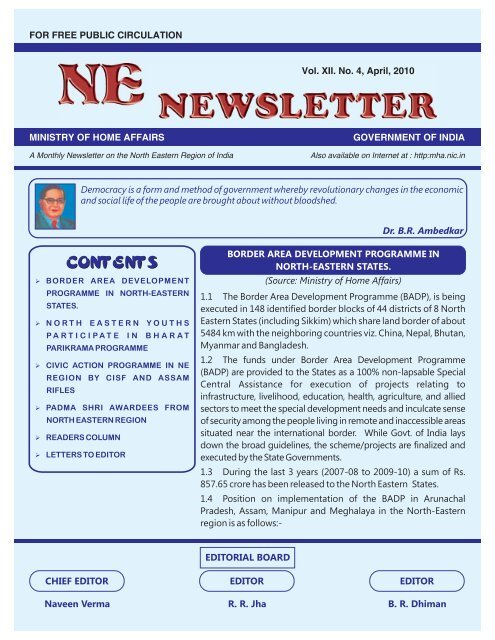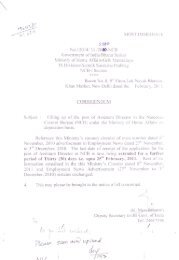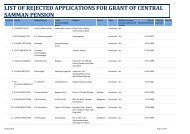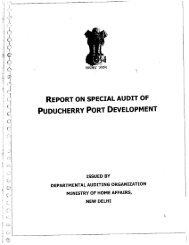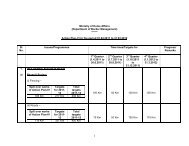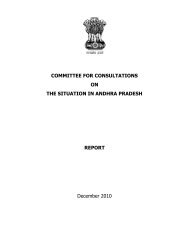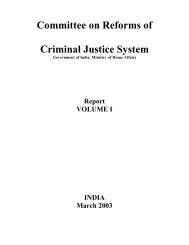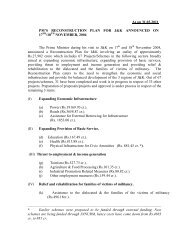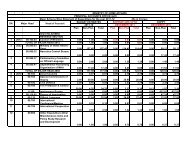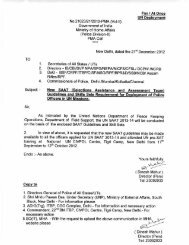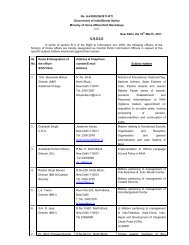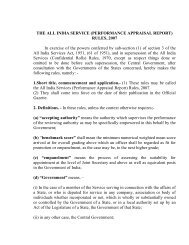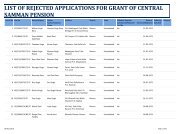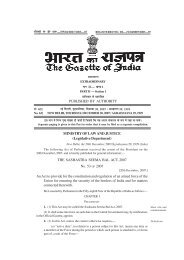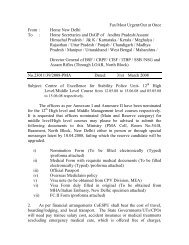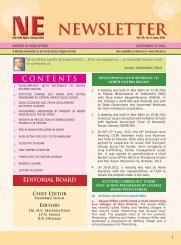April-2010 - Ministry of Home Affairs
April-2010 - Ministry of Home Affairs
April-2010 - Ministry of Home Affairs
Create successful ePaper yourself
Turn your PDF publications into a flip-book with our unique Google optimized e-Paper software.
FOR FREE PUBLIC CIRCULATION<br />
Vol. XII. No. 4, <strong>April</strong>, <strong>2010</strong><br />
MINISTRY OF HOME AFFAIRS GOVERNMENT OF INDIA<br />
A Monthly Newsletter on the North Eastern Region <strong>of</strong> India Also available on Internet at : http:mha.nic.in<br />
Democracy is a form and method <strong>of</strong> government whereby revolutionary changes in the economic<br />
and social life <strong>of</strong> the people are brought about without bloodshed.<br />
CONTENTS<br />
BORDER AREA DEVELOPMENT<br />
PROGRAMME<br />
STATES.<br />
IN NORTH-EASTERN<br />
NORTH EASTERN YOUTHS<br />
PARTICIPATE IN BHARAT<br />
PARIKRAMA PROGRAMME<br />
CIVIC ACTION PROGRAMME IN NE<br />
REGION<br />
RIFLES<br />
BY CISF AND ASSAM<br />
PADMA SHRI AWARDEES FROM<br />
NORTH EASTERN REGION<br />
READERS COLUMN<br />
LETTERS TO EDITOR<br />
EDITORIAL BOARD<br />
Dr. B.R. Ambedkar<br />
1.1<br />
BORDER AREA DEVELOPMENT PROGRAMME IN<br />
NORTH-EASTERN STATES.<br />
(Source: <strong>Ministry</strong> <strong>of</strong> <strong>Home</strong> <strong>Affairs</strong>)<br />
The Border Area Development Programme (BADP), is being<br />
executed in 148 identified border blocks <strong>of</strong> 44 districts <strong>of</strong> 8 North<br />
Eastern States (including Sikkim) which share land border <strong>of</strong> about<br />
5484 km with the neighboring countries viz. China, Nepal, Bhutan,<br />
Myanmar and Bangladesh.<br />
1.2 The funds under Border Area Development Programme<br />
(BADP) are provided to the States as a 100% non-lapsable Special<br />
Central Assistance for execution <strong>of</strong> projects relating to<br />
infrastructure, livelihood, education, health, agriculture, and allied<br />
sectors to meet the special development needs and inculcate sense<br />
<strong>of</strong> security among the people living in remote and inaccessible areas<br />
situated near the international border. While Govt. <strong>of</strong> India lays<br />
down the broad guidelines, the scheme/projects are finalized and<br />
executed by the State Governments.<br />
1.3 During the last 3 years (2007-08 to 2009-10) a sum <strong>of</strong> Rs.<br />
857.65 crore has been released to the North Eastern States.<br />
1.4 Position on implementation <strong>of</strong> the BADP in Arunachal<br />
Pradesh, Assam, Manipur and Meghalaya in the North-Eastern<br />
region is as follows:-<br />
CHIEF EDITOR EDITOR<br />
EDITOR<br />
Naveen Verma R. R. Jha<br />
B. R. Dhiman
BADP in Arunachal Pradesh<br />
1.1 BADP is being implemented in 37 blocks <strong>of</strong> 12<br />
border districts <strong>of</strong> Arunachal Pradesh. State<br />
Government has utilized funds mainly on<br />
construction <strong>of</strong> School buildings, hostels,<br />
Construction <strong>of</strong> Public Health Centers (PHCs),<br />
purchase <strong>of</strong> Ambulances, mobile dispensaries,<br />
construction <strong>of</strong> community centres , construction <strong>of</strong><br />
roads, paths, culverts and bridges, tracks, mule<br />
tracks, social infrastructure, forest conservation,<br />
drinking waters facilities and power generation<br />
through micro hydel projects.<br />
1.2 Allocation, Releases and Utilization <strong>of</strong> funds under BADP:<br />
During <strong>2010</strong>-11 an amount <strong>of</strong> Rs. 5850.00 lakh<br />
has been allocated under BADP<br />
1.3 Besides the schemes/projects included by the<br />
State Government in the Annual Action Plan <strong>of</strong> BADP,<br />
additional works amounting to Rs. 1875 lakh during<br />
2007-08 and Rs. 4695 lakh during 2008-09 have<br />
been sanctioned over and above the allocation <strong>of</strong><br />
the State out <strong>of</strong> the savings. During the year 2009-<br />
10, an amount <strong>of</strong> Rs. 800.00 lakh has been<br />
sanctioned for various works.<br />
2. BADP in Assam:<br />
2.1 BADP is being implemented in 28 blocks <strong>of</strong><br />
07 border districts <strong>of</strong> Assam. State Government<br />
utilized funds under BADP mainly on<br />
construction <strong>of</strong> school buildings, construction <strong>of</strong><br />
public health centres (PHCs), construction <strong>of</strong><br />
community centre, construction <strong>of</strong> roads, paths,<br />
culverts and bridges, social infrastructure and<br />
drinking water facilities.<br />
2.2 Allocation, Releases and Utilization <strong>of</strong> funds under BADP:<br />
During <strong>2010</strong>-11 an amount <strong>of</strong> Rs. 2424 lakh has<br />
been allocated for BADP Schemes.<br />
3. BADP in Manipur<br />
3.1 BADP is being implemented in 8 border blocks<br />
<strong>of</strong> 3 border districts <strong>of</strong> Manipur. State Govt. has<br />
2<br />
utilized funds under BADP mainly on construction <strong>of</strong><br />
school buildings, construction <strong>of</strong> public health<br />
centres (PHCs), construction <strong>of</strong> community centers,<br />
construction <strong>of</strong> roads, paths, culverts and bridges,<br />
social infrastructure, drinking waters facilities etc.
3.2 Allocation, Release and Utilization <strong>of</strong> funds under BADP<br />
During <strong>2010</strong>-11 an amount <strong>of</strong> Rs. 1343.00 lakh<br />
has been allocated for BADP schemes.<br />
3.3 Besides the schemes/projects included by the<br />
State Government in the Annual Action Plan <strong>of</strong> BADP,<br />
additional works amounting to Rs. 300 lakh during<br />
2007-08 and Rs. 750 lakh during 2009-10 have been<br />
sanctioned over and above the allocation <strong>of</strong> the<br />
State out <strong>of</strong> the savings.<br />
3<br />
4. BADP in Meghalaya<br />
4.1 BADP is being implemented in 10 blocks <strong>of</strong> 05<br />
border districts <strong>of</strong> Meghalaya. State Government<br />
has utilized funds under BADP mainly on<br />
construction <strong>of</strong> school buildings, construction <strong>of</strong><br />
public health centres, construction <strong>of</strong> roads/paths,<br />
culverts and bridges, social infrastructure, and<br />
fisheries.<br />
4.2 Allocation, Releases and Utilization <strong>of</strong> funds under BADP;<br />
During <strong>2010</strong>-11 an amount <strong>of</strong> Rs. 1247.00 lakh<br />
has been allocated for BADP schemes.<br />
4.3 Besides the schemes/projects included by the<br />
State Government in the Annual Action Plan <strong>of</strong> BADP,<br />
additional works amounting to Rs. 98.80 lakh during<br />
2007-08 and Rs. 400.19 lakh during 2009-10 have<br />
been sanctioned over and above the allocation <strong>of</strong><br />
the State out <strong>of</strong> the savings.<br />
(Details <strong>of</strong> BADP programme in Mizoram, Nagaland,<br />
SikkimandTripuratobecontinuedinthenextissue.)<br />
NORTH EASTERN YOUTHS PARTICIPATE IN BHARAT PARIKRAMA PROGRAMME<br />
During 2009-10, <strong>Ministry</strong> <strong>of</strong> <strong>Home</strong> <strong>Affairs</strong><br />
supported 05 major programmes through Nehru Yuva<br />
Kendra Sangathan (NYKS) in North Eastern States<br />
namely Knit India Yuva Yatra Programme, Bharat<br />
Parikrama Programme, North Eastern Music Concert<br />
programme, Street Theater / Kala Jatha Campaign for<br />
local peace and harmony and life skills programme.<br />
Bharat Parikrama Programme, one <strong>of</strong> the Knit<br />
India Yuva Yatra programmes was organized by<br />
(Source: NYKS)<br />
Nehru Yuva Kendra Sangathan. Under this<br />
programme 77 North Eastern Youths (45 male & 32<br />
female) selected from 08 States <strong>of</strong> North East India<br />
alongwith 04 <strong>of</strong>ficial escorts were provided<br />
opportunities to visit important places which<br />
included Kolkata (West Bengal), Bhubaneswar<br />
(Orissa), Bhopal (Madhya Pradesh), Delhi and<br />
Lucknow (Uttar Pradesh). A series <strong>of</strong> meaningful<br />
interactive programmes and activities as well as field
visits were organized. A brief summary <strong>of</strong> Bharat<br />
Parikrama Programme is as follows:<br />
At Kolkata the Bharat Parikrama Participants<br />
th th<br />
stayed for 03 days from 5 to 7 March, <strong>2010</strong>. Here,<br />
they got the opportunity to visit Krishi & Shilp<br />
Mela, International Kolkata Book Fair and interact<br />
with students <strong>of</strong> Ramakrishna Vivekananda<br />
University and Shri D.P.Ray, Ex M.P and former<br />
member <strong>of</strong> NYKS, Board <strong>of</strong> Governors. Shri Ray<br />
called upon the North Eastern youth to shun their<br />
regional differences and broden their knowledge &<br />
information about people living in different parts<br />
<strong>of</strong> India and develop appreciation <strong>of</strong> their distinct<br />
life style, tradition and culture by taking full<br />
advantage <strong>of</strong> the opportunities to travel different<br />
places <strong>of</strong> India. The participants visited famous<br />
market places, Netaji Park, Victoria Memorial &<br />
also saw Howrah Bridge, Eden Garden etc.<br />
The Bharat Parikrama Participants arrived at<br />
th<br />
BHUBANESHWAR on 8 March, <strong>2010</strong> and stayed<br />
th th<br />
from 8 to 10 March, <strong>2010</strong>. The participants visited<br />
KIIT AND KISS UNIVERSITY founded by Dr. A.<br />
Samanta. The university provides free education and<br />
vocational Training in various trades to about 10000<br />
Tribal Students including students from North East.<br />
During their 03 days stay, they also met His<br />
Excellency Governor <strong>of</strong> Orissa Shri Murlidhar<br />
Chandrakant Bhandare who lauded the joint efforts<br />
<strong>of</strong> MHA and NYKS for creating opportunity for a<br />
group <strong>of</strong> youths from North Eastern States to visit<br />
different places <strong>of</strong> India. As part <strong>of</strong> their field visit,<br />
participants visited the famous “ADIVASHI MELA,<br />
<strong>2010</strong>”, Santi Stupa(Peace pagoda) Dhauligiri, Konark<br />
Temple, Lord Jagannath Temple at Puri, Udaygiri<br />
Khandagiri caves and Puri Beach etc.<br />
th<br />
The Participants arrived at BHOPAL on 11<br />
th<br />
March, <strong>2010</strong> and stayed for 04 days i.e. upto 15<br />
March, <strong>2010</strong>. Pr<strong>of</strong>. P.B. Sharma,Vice Chancellor <strong>of</strong><br />
Delhi Technical University, Captain V.P.<br />
4<br />
Singh(retired)-Eminent Social Worker, Digvijay<br />
Singh-Ex Chief Minister <strong>of</strong> MP, and other dignitaries<br />
addressed the participants. Pr<strong>of</strong>. P.B. Sharma<br />
highlighted the various aspects <strong>of</strong> national<br />
integration and the need for assimilation <strong>of</strong> different<br />
cultures <strong>of</strong> India and promotion <strong>of</strong> peace and ethnic<br />
harmony in North East India. Participants also visited<br />
T.T.Nagar market, famous Shiva Temple and Bhopal<br />
Lake. Before their departure to Delhi, participants<br />
also met his Excellency Governor <strong>of</strong> Madhya Pradesh<br />
Shri Rameshwar Thakur.<br />
In DELHI, the <strong>of</strong> participants on the very first day<br />
th<br />
<strong>of</strong> their arrival at Delhi on 16 <strong>of</strong> March, <strong>2010</strong>, had<br />
interaction with Shri G.K.Pillai, <strong>Home</strong> Secretary and<br />
Shri. Naveen Verma, Joint Secretary (North East) and<br />
other <strong>of</strong>ficials <strong>of</strong> <strong>Ministry</strong> <strong>of</strong> <strong>Home</strong> <strong>Affairs</strong> at North<br />
Block. All the team leaders shared their experiences<br />
<strong>of</strong> the journey and said that wherever they passed<br />
through any public or market place people in<br />
general treated them as if they were foreigners but<br />
when they came to know that “We are youths from<br />
North East India, they wondered with great<br />
happiness. And, the kind <strong>of</strong> love and respect people<br />
showered on us at every place, we felt proud to be an<br />
Indian.” <strong>Home</strong> Secretary told them about the<br />
vastness <strong>of</strong> India and linguistic & cultural differences<br />
which can only be bridged by progressive young<br />
generation <strong>of</strong> this country. He also asked them to<br />
visit President House and other Historical Places <strong>of</strong><br />
Delhi during their 04 days stay in Delhi.<br />
The participants visited Rashtpati Bhawan and<br />
Mugal Garden as well as Gandhi Smriti at 30 January<br />
Marg, apart from Teen Murti, Qutub Minar, Lotus<br />
Temple, Rajghat, Kishanghat, Samata Sthal, Chandini<br />
Chowk, Lal Quila etc.<br />
On 20.3.<strong>2010</strong> in LUCKNOW the participants<br />
interacted with the participants <strong>of</strong> National<br />
Integration Camp organized by NYKS UP Zone.
Shri B.B. Chobal, Chief General Manager <strong>of</strong> SBI,<br />
addressed the joint gathering on the role <strong>of</strong> banking<br />
sector for social and economic welfare <strong>of</strong> young<br />
persons. The participants visited Deva Sharif Dargah,<br />
Yuba Bikash Kendra and Jahangirabad Educational<br />
Trust Group <strong>of</strong> Institutions in Barabanki District. They<br />
interacted with District Magistrate <strong>of</strong> Barabanki.<br />
Participants also visited important historical, religious<br />
and social places like “Samajik Prajyatan Sthal,<br />
Ambedkar Park, Bhool-Bhulaiyan and famous<br />
Residency Palace associated with 1857 First War <strong>of</strong><br />
Independence situated in different parts <strong>of</strong> Lucknow.<br />
(Source: <strong>Ministry</strong> <strong>of</strong> <strong>Home</strong> <strong>Affairs</strong>)<br />
5<br />
The Closing Function <strong>of</strong> Bharat Parikrama<br />
rd<br />
Programme was held on 23 March, <strong>2010</strong>. Dr. Lalit<br />
Burma, Principal Secretary, Department <strong>of</strong> Youth<br />
Welfare, Govt. <strong>of</strong> UP, Shri S.A.Khan, Director General,<br />
(Youth Welfare) and Shri Nand Gopal Gupta 'Nandi',<br />
Minister <strong>of</strong> Institutional Finance (Govt. <strong>of</strong> UP) were<br />
present on the occasion and all <strong>of</strong> them highlighted<br />
the necessity to organize such youth exchange<br />
programmes and appealed to the youths from<br />
different districts <strong>of</strong> North East to carry with them<br />
the most vital and important message to believe in<br />
the merit <strong>of</strong> the Indian democracy and build a<br />
modern progressive and peaceful North East India.<br />
CIVIC ACTION PROGRAMME IN NORTH EASTERN REGION<br />
CENTRAL INDUSTRIAL SECURITY FORCE<br />
(a) On 18.2.<strong>2010</strong>, CISF organized a 'Free Medical<br />
Camp' for the public <strong>of</strong> Salakab and surrounding<br />
villages in co-operation with PGCIL Management. The<br />
Camp was inaugurated by, Dy. General Manager,<br />
SBSS/PGCIL Salakati and about 400 people from<br />
nearby villages availed medical treatment. The<br />
medicines were supplied by the Director, Medical &<br />
Health <strong>of</strong> District, Kokrajhar and Chirang (Assam) for<br />
free distribution amongst the villagers. The<br />
sponsoring managements had also procured<br />
medicines worth Rs. 16,000/- for free distribution in<br />
the Camp. In their closing address, organizers were all<br />
praise for CISF personnel for their assistance in making<br />
the Camp a success. Several noted Physicians and<br />
specialists from the Districts <strong>of</strong> Kokrajhar and Chirang<br />
rendered assistance by providing free medical<br />
services for the said Camp.<br />
(b) On 2.3.<strong>2010</strong>, a world Harmony Rally (Vishwa<br />
Sadhavana daud) was organized at Sibsagar District<br />
(Assam) wherein representatives <strong>of</strong> different<br />
religious organizations put forth their views on the<br />
need and importance <strong>of</strong> 'World Harmony'.<br />
(c) On 6.3.<strong>2010</strong>, a Cycle Rally was conducted by CISF<br />
Unit OPS Noonmati (Assam) personnel in the market<br />
area <strong>of</strong> Narangi and Patharquary to spread<br />
awareness in public regarding the importance <strong>of</strong><br />
security in general public life.
CIVIC ACTION PROGRAMME IN NE REGION BY ASSAM RIFLES IN THE<br />
MONTH OF MARCH <strong>2010</strong><br />
(Source: DG ASSAM RIFLES)<br />
Churachandpur<br />
PADMA SHRI AWARDEES FROM NORTH EASTERN REGION<br />
Shri Arun Sarma<br />
Shri Arun Sarma, one <strong>of</strong> the most versatile<br />
dramatists <strong>of</strong> Assam who has been instrumental in<br />
shaping modern Assamese drama is equally at home<br />
in the medium <strong>of</strong> creative writing and is a significant<br />
novelist <strong>of</strong> the present times. His novels are very<br />
sensitive and <strong>of</strong> the classical mould, wide in their<br />
scope, rich and varied in their characterization and<br />
drama. A harbinger <strong>of</strong> modernity in Assamese drama,<br />
he is one <strong>of</strong> those rare writers who observe the world<br />
with a clinical detachment but with sensitive concern.<br />
rd<br />
2. Born on 3 November, 1931, Shri Sarma<br />
graduated from Cotton College, Guwahati, Assam.<br />
He joined the Guwahati Station <strong>of</strong> All India Radio in<br />
1960 as Producer, Educational Broadcast and retired<br />
as Director, North Eastern Service <strong>of</strong> All India Radio<br />
in 1989. He was then Editor <strong>of</strong> 'Purbanchal', a weekly<br />
news magazine from where after two years, he<br />
became Director <strong>of</strong> the Information service (Tea<br />
Centre) <strong>of</strong> India Tea Association, Calcutta.<br />
3. Shri Sarma is a renowned broadcaster specializing<br />
in educational programmes with his 6-month training<br />
in BBC, London. He is also a well known radio<br />
playwright with about fifty radio plays to his credit and<br />
an ace radio documentary programme maker. He has<br />
been President <strong>of</strong> Asom Natya Sanmilan, the largest<br />
6<br />
drama organization in the North East <strong>of</strong> India for five<br />
years and is now associated with a number <strong>of</strong><br />
important state and national level social, literary and<br />
cultural advisory committees.<br />
4. Shri Sarma has the distinction <strong>of</strong> having received<br />
Sahitya Akademi award for literature and Sangeet<br />
Natak Akademi award for his contribution to drama.<br />
He also received Assam Valley Literary award<br />
instituted by Williamson Magor Education Trust in<br />
recognition <strong>of</strong> his lifetime achievement in the field <strong>of</strong><br />
literature. He has also received Assam Sahitya Sabha<br />
(Drama) award and Assam Natya Sanmilan award.<br />
He is also recipient <strong>of</strong> international awards like Japan<br />
Prize International, Asia Pacific Broadcasting Union
(ABU) award and Prix Future Berlin award for his<br />
documentaries dealing with subjects like distressed<br />
children and environment.<br />
Smt. Haobam Ongbi Ngangbi Devi<br />
Smt. Haobam Ongbi Ngangbi Devi has been<br />
among the foremost exponents <strong>of</strong> Manipuri Ras. She<br />
received her initial training in Ras Leela, Nata<br />
Sankirtan and Lai-Haraoba from renowned gurus<br />
including Maishnam Amubi Singh, Haobam Atomba<br />
Singh and Kshestrimayum Ojha Bidhu Singh and the<br />
Manipuri martial arts from Ojha Pheijao Sana and<br />
Ojha Damu Singh.<br />
2. Born on August 1, 1924 in Imphal, Manipur, Smt.<br />
Ngangbi Devi joined Jawaharlal Nehru Manipur Dance<br />
Academy, Imphal in 1954 as a musician and over the<br />
years gained eminence as a teacher and performer. She<br />
also won wide popularity in Manipur as Ras Leela<br />
performer, excelling in dance as well as in vocal. Smt.<br />
Ngangbi Devi served as Vice-Principal <strong>of</strong> Jawaharlal<br />
Nehru Manipur Dance Academy from 1973 to 1985,<br />
where she trained a large number <strong>of</strong> students who are<br />
leading performers at present. In 1936 and 1937, she<br />
also performed as an actress in the Manipur Dramatic<br />
Union (MDU) and Aryan Theatre, leading theatre groups<br />
<strong>of</strong> Manipur. Smt. Ngangbi Devi visited Rangoon in 1964<br />
as member <strong>of</strong> the Indian cultural delegation sponsored<br />
bytheGovernment<strong>of</strong>India.<br />
3. Smt. Ngangbi Devi was awarded Gold medal and<br />
Birangana in 1951 by the Governor <strong>of</strong> Assam for her<br />
excellent dance performance. She was honoured with<br />
Manipur State Kala Akademi Award in 1980; Nritya<br />
Bhushan by the Manipur Sahitya Parishad in 1985.<br />
She also received the Sangeet Natak Adademi award<br />
in 1993 for her contribution to Manipur Ras in 1994.<br />
7<br />
Shri Rajkumar Achouba Singh<br />
Shri Rajkumar Achouba Singh, former Principal,<br />
Jawaharlal Nehru Manipur Dance Academy, Imphal<br />
and Baar Senapati <strong>of</strong> Manipur Gondajee Temple<br />
Board, Imphal is widely recognized as a leading<br />
scholar and Guru in Manipuri dance specially in Ras<br />
and Laiharaoba. He has been playing pioneering role<br />
in dance, music and direction specially dance drama<br />
for the last 40 years.<br />
2. Born on December, 5, 1938, Shri Rajkumar<br />
obtained diploma in Manipuri dance in 1972, post<br />
graduate degree in Leiharaoba and post graduate<br />
degree in Ras from J.N. Manipur Dance Academy,<br />
Imphal in 1974. He has been visiting Guru at<br />
Govindajee Natralaya, Government Dance College,<br />
Imphal.<br />
3. Shri Rajkumar has been Founder-Honorary<br />
Director <strong>of</strong> Anoi Shindampham Imphal since 2003.<br />
He has visited all capital cities <strong>of</strong> India with<br />
Manipuri Cultural troupes in the last 45 years and<br />
also visited South Korea, Phillippines and Thailand<br />
with Indian contingents. Shri Rajkumar also served<br />
as a regular guest lecturer on Manipuri Dance with<br />
attachment training for IAS probationers from<br />
2007-2009.<br />
4. Shri Rajkumar Achouba authored books on Penna<br />
Anoi based on dance and music <strong>of</strong> Manipuri culture in<br />
1997. He has also been a regular writer and contributor<br />
toleadingnationaljournalsonheritage<strong>of</strong>Manipur.<br />
5. Shri Rajkumar is recipient <strong>of</strong> many awards and<br />
honours. He was conferred fellowship on Laiharaoba<br />
Dance by the Manipur State Kala Academy Imphal in<br />
1972 and State Award on Laiharaoba Dance in 1996.<br />
He has been a member, Eastern Zone Cultural<br />
Centre, Calcutta and North Eastern Zone Cultural<br />
Centre Dimapur, Nagaland.
READERS COLUMN<br />
The NE monthly Newsletter is being published in<br />
English, Assamese, Bengali and Manipuri and has<br />
circulation <strong>of</strong> 40,000. <strong>Ministry</strong> <strong>of</strong> <strong>Home</strong> <strong>Affairs</strong> brings out<br />
the publication incorporating important<br />
information/developments concerning North Eastern<br />
States.<br />
<strong>Ministry</strong> <strong>of</strong> <strong>Home</strong> <strong>Affairs</strong>, through the Newsletter,<br />
would request for inputs for the Newsletter from the<br />
Government agencies, institutions and individuals<br />
highlighting the area specific issues, problems, special<br />
features including potential for tourism,<br />
environmental protection or special<br />
efforts/achievement in various fields. The views and<br />
write ups from intellectuals, pr<strong>of</strong>essionals and others<br />
from the North-Eastern States are also invited on<br />
specific issues/problems and possible measures for<br />
resolution thereto.<br />
RNI Reg. No. R-72398/99<br />
It is requested that specific<br />
articles/columns should be sent<br />
in a hard copy format<br />
accompanied by floppy/CD<br />
version alongwith photographs.<br />
Articles should be accompanied<br />
by an abstract <strong>of</strong> a maximum <strong>of</strong><br />
150-200 words. Papers should<br />
not have been simultaneously<br />
submitted for publication to<br />
another journal or News paper.<br />
Readers are encouraged to send<br />
comments and suggestions<br />
(300-400 words) on published<br />
articles. All letters should have<br />
the writer's full name and postal address. The selected articles will<br />
be suitably incorporated in the monthly NE Newsletter in its<br />
subsequent editions and contribution will be welcomed and<br />
suitablyrewarded.<br />
LETTERS TO EDITOR<br />
I come across your NE Newsletter vol. no. 12, December 2009 today and I find it very interesting, it talks about<br />
many issues<br />
I would like to request you to kindly send me English copy at the following address.<br />
Namdithiu pamei, Tharon,<br />
Thangmeiband, Imphal West 795001<br />
Manipur.<br />
2. We would greatly appreciate receiving a reprint or a copy <strong>of</strong> your “NE Newsletter” published recently.<br />
Reprints <strong>of</strong> your other (all the recent ones) papers on the same or similar subject would be very much<br />
appreciated. Our address can also be included in you mailing list.<br />
Thanking for your cooperation.<br />
The President,<br />
Pondicherry Post – Graduates in Ecology &<br />
Environmental Sciences Association,<br />
Reg No. 365/2003.<br />
Srimivasa Cunderl Sl,<br />
Sellepaumrl, Lawspet Post,<br />
Pondicherry – 605008.<br />
3. I shall be highly obliged, if you would kindly include me in the permanent mailing list <strong>of</strong> NE Newsletter<br />
for life subscription. If so, I remain thankful to you, always.<br />
Further, I humbly beg you to kindly send me your regular promotional materials from time to time, including<br />
complementary copies <strong>of</strong> book <strong>of</strong> North East in particular (published by NE Division, MHA). Thanking you in anticipation.<br />
Lian Chinthang Gwite<br />
Guite Ville, Mualveng<br />
Upper Lamka, P.O. Box 19<br />
Vialzachyn – 795128.<br />
Manipur (North East India).<br />
MHA requests the readers to send their response through e-mail at: nenchiefeditor@nic.in/neneditor@nic.in/donedc-mha@nic.in<br />
Request for free copy <strong>of</strong> the NE Newsletter indicating language preferred or suggestions, if any,<br />
may be sent to the chief Editor/Editor at the address given below:<br />
Edited and Published by N.E. Division, <strong>Ministry</strong> <strong>of</strong> <strong>Home</strong> <strong>Affairs</strong>, North Block, New Delhi-110 001<br />
Printed by: I G Printers Pvt. Ltd.,104, DSIDC Okhla Phase-I, N.D.-20, Ph.: 26810297


